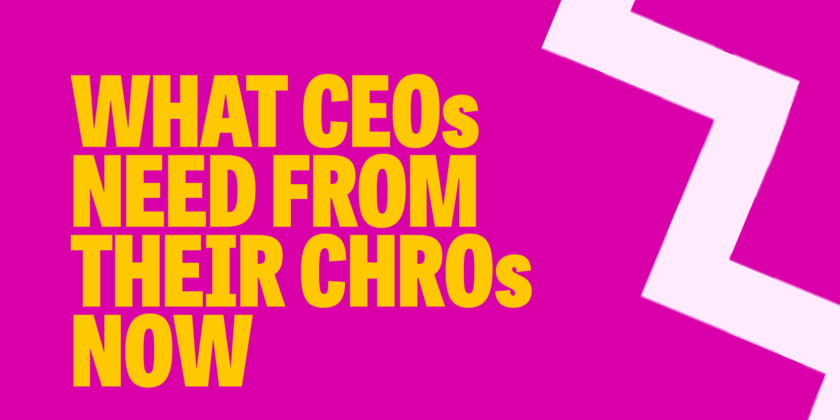The relationship between CEOs and CHROs has fundamentally shifted. What was once a functional partnership focused on HR administration has evolved into a mission-critical alliance that directly impacts business performance, strategic agility, and organisational resilience.
In 2025, CEOs are demanding more from their CHROs than ever before: strategic leadership, unvarnished candour, and the vision to design tomorrow’s workforce.
This transformation isn’t optional. Companies with strong CEO-CHRO partnerships are outperforming their peers. In fact, a 2023 Deloitte study found firms where CEOs and CHROs closely collaborate report a 20% higher employee engagement score, with direct impacts on retention and productivity.
The question isn’t whether CHROs need to step up – it’s how quickly they can evolve from HR overseers to trusted business strategists.
Why the CHRO Role is Mission-Critical
The CHRO has emerged as a co-architect of business strategy, not merely its executor. Today’s CHROs shape everything from market entry decisions to merger integration, from crisis response to cultural transformation. They’re the bridge between human capital and business outcomes, translating people’s insights into competitive advantage.
This evolution reflects a fundamental business reality. In an era where talent scarcity meets technological disruption, the organisations that thrive are those that can attract, develop and retain exceptional people while building cultures that drive innovation and agility.
The most effective CEO-CHRO partnerships operate as true strategic alliances. CEOs rely on their CHROs to provide honest assessments of leadership capability, identify emerging talent risks and designing people strategies that fuel business transformation. In return, CHROs gain the executive sponsorship and resources needed to drive meaningful organisational change.
What CEOs Expect Most from CHROs
Today’s CEOs have heightened expectations that extend far beyond traditional HR competencies. They need CHROs who can think like business leaders first and HR professionals second.
Business Acumen and Strategic Partnership
The modern CHRO has to demonstrate a deep understanding of business fundamentals – market dynamics, financial drivers, competitive positioning and customer needs.
CEOs expect their CHROs to contribute meaningfully to strategic discussions, offering insights that connect people capabilities to business outcomes. This means understanding how talent decisions impact revenue growth, operational efficiency and market expansion.
Transformation Leadership has become equally critical. CHROs must drive organisational change initiatives, whether that’s digital transformation, cultural evolution or business model innovation. They need to anticipate the human implications of strategic shifts and design people strategies that enable rather than constrain business agility.
Technology Fluency and Analytics
In 2025, technological fluency isn’t optional for CHROs. They must understand how AI, automation and digital platforms are reshaping work itself. This includes leveraging people analytics to drive decision-making, implementing AI-powered talent tools, and helping organisations navigate the human implications of technological change.
CEOs also expect their CHROs to use data storytelling to demonstrate the business impact of people initiatives. This means connecting engagement scores to customer satisfaction, linking leadership development investments to innovation outcomes, and quantifying the ROI of culture change programmes.
Succession Planning and Leadership Development
Perhaps no CHRO responsibility is more critical to CEOs than succession planning. CHROs must identify and develop future leaders while ensuring continuity of key roles. This requires sophisticated assessment capabilities, strategic workforce planning, and the ability to balance internal development with external recruitment.
Crisis readiness has become equally important. CHROs must help organisations build resilience through scenario planning, leadership bench strength and adaptive capacity development.
Candour and Strategic Challenge
The most valued CHROs are those who provide direct, honest feedback to their CEOs and executive teams. This means challenging assumptions about leadership effectiveness, highlighting blind spots in organisational capability, and advocating for difficult but necessary changes.
CEOs need CHROs who can have uncomfortable conversations about performance, culture and leadership while maintaining trust and partnership. This requires exceptional emotional intelligence, communication skills and the courage to speak truth to power.
2025’s Essential CEO-CHRO Strategic Priorities
The strategic priorities driving CEO-CHRO partnerships have crystallised around several key areas that will define organisational success in the coming years:
Workforce Planning and Talent Mobility
These are foundational capabilities. CHROs must help organisations anticipate future skill needs, design flexible career pathways and create talent ecosystems that extend beyond traditional employment boundaries. This includes building partnerships with educational institutions, creating alumni networks, and developing freelance and contractor relationships.
The Employee Experience
This requires complete reimagining. CHROs need to design work experiences that attract top talent while driving productivity and engagement. This means rethinking everything from onboarding and career development to performance management and recognition systems.
Purpose-driven, Agile Organisations
CHROs must help define and embed organisational purpose, while building the structural and cultural agility needed to respond rapidly to market changes. This requires balancing stability with adaptability, creating psychological safety while maintaining performance standards.
HR KPIs that align with enterprise strategy
This means moving beyond traditional metrics like turnover and engagement to focus on more business-relevant ones like time-to-productivity, innovation pipeline strength and leadership readiness ratios. Our team performance frameworks help organisations develop these key strategic measurement approaches.
Building Effective Partnerships
The strongest CEO-CHRO partnerships are built on candour, trust, and shared accountability. These relationships thrive when both leaders commit to open communication, even when conversations are difficult.
Strategic influence emerges when CHROs consistently demonstrate business impact. This means shaping succession decisions, driving cultural transformation, advancing diversity and inclusion initiatives, and building organisational agility.
Action Checklist for CHROs
To build CEO partnership effectiveness, CHROs should focus on several key areas:
- Develop business literacy through formal education, cross-functional projects and regular engagement with customers and market dynamics.
- Create measurement frameworks that demonstrate the business impact of people initiatives.
- Build stakeholder relationships across the C-suite, board and key business units.
- Invest in personal development through executive coaching, peer networks and continuous learning.
- Practice strategic communication by framing people issues in business terms and proposing solutions that address commercial objectives.
Our coaching and assessment programmes help CHROs develop these critical abilities while building the confidence needed to operate as strategic partners.
LTT’s Approach to CEO-CHRO Success
At Let’s Talk Talent, we understand that transforming the CEO-CHRO partnership requires both strategic thinking and practical implementation. We help CHROs develop the business acumen, strategic frameworks and leadership presence needed to become true executive partners.
Our approach focuses on three core areas:
1. Stakeholder relationship transformation
2. Business partnering enhancement
3. Executive alignment facilitation
We work with CHROs to diagnose current partnership effectiveness, identify development opportunities and create action plans that drive measurable improvement in both relationship quality and business outcomes.
One recent client, a technology scale-up CHRO, worked with us to transform their relationship with the CEO during a critical growth phase. Through strategic coaching and stakeholder mapping, they evolved from reporting HR metrics to co-creating the people strategy that enabled successful international expansion.
The partnership became so effective that the CEO credited the CHRO as instrumental in achieving their aggressive growth targets while maintaining culture and engagement.
Our people development strategies provide the foundation for these transformational partnerships, helping CHROs build the capabilities needed to drive business success through people excellence.
Ready to Power Your CEO-CHRO Alliance for Transformational Success?
Book a partnership audit or strategy session with Let’s Talk Talent to discover how we can help you build a strategic relationship that drives performance through people excellence.



